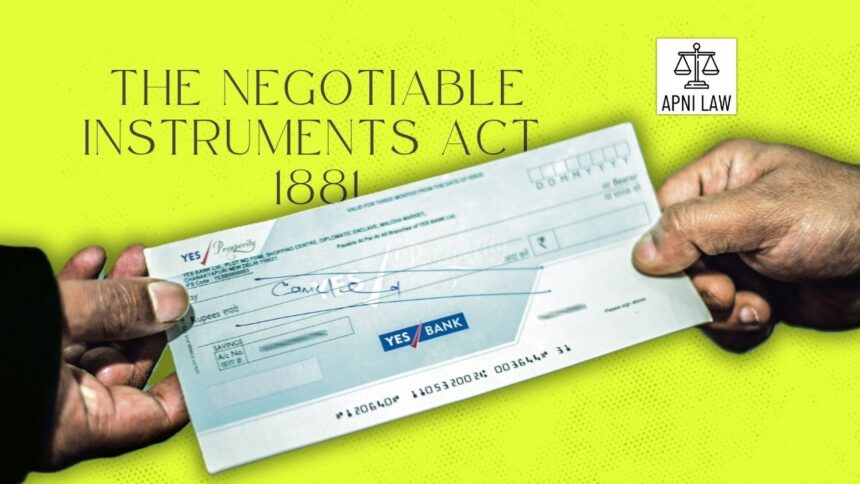Introduction
A negotiable instrument is a vital legal tool used in financial transactions to ensure the smooth transfer of money from one party to another. Governed by the Negotiable Instruments Act, 1881, it includes written documents such as cheques, promissory notes, and bills of exchange. These instruments are freely transferable and carry a legal promise to pay a certain sum.
Definition of a Negotiable Instrument
As per Section 13(1) of the Act, a negotiable instrument refers to a promissory note, bill of exchange, or cheque that is payable either to order or to bearer. These instruments allow the holder to claim the money mentioned and to transfer the right to payment to others, subject to certain legal conditions.
What Does Payable to Order Mean
A negotiable instrument is said to be payable to order when it explicitly mentions that it is so payable or when it is payable to a particular person without any language that restricts its transfer. In such cases, the named person can endorse and deliver the instrument to another person, thereby transferring the right to receive payment.
What Is Payable to Bearer
An instrument becomes payable to bearer if it is clearly stated as such or if the only or last endorsement is in blank. In this case, anyone in possession of the instrument has the right to claim the amount mentioned, without needing further endorsement.
If a promissory note, bill of exchange, or cheque is expressed to be payable to a specified person and not to his order, it is still considered payable to him or his order at his discretion. This provision preserves the negotiable nature of the instrument and provides flexibility to the holder.
A negotiable instrument can be structured to be payable jointly to two or more payees. Alternatively, it may be made payable in the alternative to any one of several payees, giving the drawer the choice of who can receive the payment.
The Legal Status of a Cheque
A cheque is recognized as a specific type of bill of exchange. It must be drawn on a specified banker and must be payable only on demand. The definition of a cheque now includes both its physical form and its electronic variations, making it adaptable to modern banking needs.
An electronic cheque is created using a computer resource and must be signed using a secure system. This includes the use of a digital signature, which may or may not include biometric features. The digital signature must conform to either an asymmetric cryptosystem or other legally accepted forms of electronic signatures, making such cheques valid and secure.
A truncated cheque refers to a physical cheque that is electronically processed during the clearing cycle. The physical movement of the cheque is stopped after the generation of an electronic image, which is then used for all further processing. This truncation can be done either by the clearing house or by the bank responsible for making or receiving payment.
What Is A Clearing House?
The clearing house is responsible for managing the processing of cheques. It may be run by the Reserve Bank of India (RBI) or recognized by it. This institution ensures that both traditional and electronic cheques are efficiently cleared and settled between banks.
What Are Digital Financial Instruments?
Terms such as asymmetric crypto system, computer resource, digital signature, electronic form, and electronic signature have the same meaning as defined under the Information Technology Act, 2000. These legal definitions ensure consistent interpretation of digital financial instruments across Indian law.
Conclusion
The legal meaning of a negotiable instrument under the Negotiable Instruments Act, 1881 has evolved to include both traditional paper-based and digital forms. Whether it is a cheque, promissory note, or bill of exchange, the Act provides a secure and legally enforceable framework for transferring money. With the inclusion of electronic and truncated cheques, the law keeps pace with technological advancements while maintaining legal integrity in commercial transactions.








